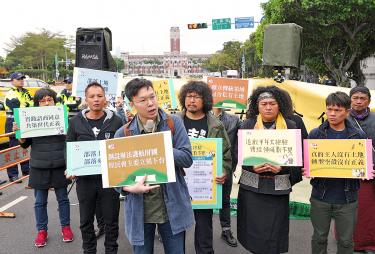Protesters decry Aboriginal land policy proposal
LEGITIMIZING THEFT?Panai Kusui, Mayaw Biho, Salone Ishahavut and Lin Fei-fan were among those who gathered to criticize the omission of private land
By Abraham Gerber / Staff reporter
Failure to include private land within the government’s legal definition of Aboriginal “traditional areas” will entrench historical oppression and injustice, Aboriginal campaigners said yesterday, blasting the government’s failure to meet its promise of transitional justice.
More than a dozen people associated with the Aboriginal Transitional Justice Classroom (原住民轉型正義小教室) gathered on Ketagalan Boulevard in front of the Presidential Office Building and shouted for villages to be allowed to declare their own traditional areas.
“Excluding private land amounts to an acknowledgement that the past behavior and policies which led to the theft of Aboriginal land were legitimate,” said Salone Ishahavut, a Bunun and a professor of indigenous development at National Chi Nan University.
She said that the 800,000 hectares which the Council of Indigenous Peoples has estimated will be covered under traditional area delineation guidelines published last week is a drastic reduction from the 1.8 million hectares it estimated should be included following a survey completed in 2007.
New guidelines restrict application of the “traditional area” label to government-owned land, explicitly excluding private land.
While it is not clear what portion of the reduction is attributable to the exclusion of private land, much of the prime real estate in traditional areas is now in private hands, Salone said.
“While this delineation of traditional areas was supposed to be about protecting our land rights, excluding privately owned land will mean the final and complete loss of original lands and their related memories,” she said.
Including privately owned land in the “traditional areas” would give Aboriginals a voice in development projects, while leaving formal ownership unchanged, she said.
“This policy is effectively saying that the system of private property can address many delicate questions and complicated processes,” said Lin Fei-fan (林飛帆), a Sunflower movement leader.
Lin said the council is using its administrative discretion to avoid tackling difficult aspects of transitional justice.
“Traditional areas should refer to the real-life space of our ancestors, but the council is focusing on the ‘status quo,’ which has already diverged from tradition. These delineation rules amount to an acknowledgement that our nation is unable to face the real history of indigenous peoples,” Amis singer-activist Panai Kusui said.
Including private land would spotlight the injustices involved in its acquisition, and could spark a national conversation, she said.
Another Amis, Mayaw Biho, a documentary filmmaker and a former head of Taiwan Indigenous TV, said the government has failed to follow through with promises to push for indigenous transitional justice in parallel with transitional justice efforts aimed at other abuses under Chinese Nationalist Party (KMT) authoritarian rule.
“The Presidential Office committee on indigenous justice held its first meeting in December [last year] and that was just an initial meeting which did not result in anything — but just look at all the Ill-gotten Party Assets Settlement Committee has been doing,” Mayaw said.

No comments:
Post a Comment